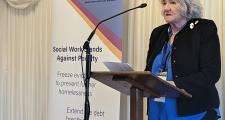Spring Statement 2025

With major tax and spending announcements usually confined to the Autumn Budget, the Spring Statement is an opportunity for the Chancellor to update on the government’s progress.
It is a typically shorter affair in comparison to the budget but, with the report card showing that the UK’s economic growth is stalling, this year’s event takes on greater significance, with more measures announced than expected. So much so, that opposition parties have dubbed it an ‘emergency budget.’
This is because inflation continues to be stubbornly high, and borrowing is higher than previously planned. While the Office for Budget Responsibility (OBR), the independent public finances watchdog, has downgraded the UK’s growth forecast from 2% to 1%.
This is happening against the backdrop of an increasingly insecure world, leading the government to raising its defence spending. “The world is changing before our eyes” was a point that the Chancellor, Rachel Reeves was keen to reinforce throughout her statement.
That may be so, but the combination of these factors adds up to it being a more difficult task for her department than it would have liked.
What does it all mean?
Rachel Reeves has always insisted that meeting her rules on borrowing – to get debt falling as a share of national income and to avoid borrowing for everyday costs – were ‘non-negotiable.’
However, the OBR has forecast a £4.1 billion deficit in the government’s budget. That means, to meet her rules without raising taxes, the Chancellor has decided to make cuts.
What was announced?
Significant changes to the welfare system aiming to save £5 billion by 2030, reductions in foreign aid spending and a £2 billion injection to boost social and affordable housebuilding in England have already been announced in recent weeks. Other additional measures announced today included:
- The Universal Credit Health element will be cut by 50% and frozen for new claimants
- Increase the number of tax fraudsters charged each year by 20%
- A new transformation fund to bring down administrative costs of running government
- Uplift in defence spending by £2.2 billion for 2025/26
Following the measures announced in today’s statement, the OBR has revised its forecast to a £9.9 billion surplus in 2029/30.
BASW’s Reaction
BASW made representations to the Treasury in the weeks leading up to today’s statement and the full spending review in June.
While we recognise the fiscal uncertainty that exists right now, we were clear with officials that the human cost of not spending now to reduce demand on statutory services is one that we can ill afford.
Our evidence called for stronger measures to tackle poverty, a laser focus on addressing the funding shortfalls in social care, investment to fix deepening workforce recruitment and retention challenges in social work, spending on prevention in mental health, and a long-term funding settlement for local authorities.
Responding to today’s statement, BASW UK Chief Executive, Dr Ruth Allen said:
“It is unacceptable that the Chancellor has chosen to inflict further cuts on welfare support for most vulnerable and marginalised in society in ways that undermine the government’s own aim to enable more people to work. Any moves to balance the books must not damage living standards or make our communities and public services poorer. This will add to demand for adult and children’s social work and other care services, as well as stretching community and charitable support systems.
“The government’s own figures show that their welfare changes will plunge 250,000 more people, including 50,000 children, into poverty. This will be causing understandable worry and distress for many disabled people and low-income households across the UK.
“Instead, the Chancellor should look at raising the revenues needed to achieve growth through taxation, ensuring those with the broadest shoulders contribute through a fairer system. Only then can we underpin our economy and society through greater equality and healthier communities in the long term.
“BASW will be responding to the government’s consultation on their welfare changes where we will be advocating for those on the lowest incomes to be protected. We will also continue to urge Ministers ahead of June’s spending review to deliver the long-term investment in public services and social care that is still desperately needed.”



